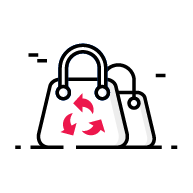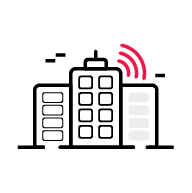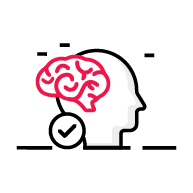THEMATIC TRACKS
Take your business and skills
THEMATIC TRACKS
Take your business and skills
to the next level
Digital Future
- Why we should invest in digital skills? – How to protect people from cyber threats (hacking, ransomware, identity theft)?
- How we should ensure Artificial Intelligence is developed in ways that respect people’s rights and earn their trust?
- Europe’s super-computing capacity to develop innovative solutions for medicine, transport and the environment
- Reduction the digital sector’s carbon emissions
- Data protection
- How we should fight disinformation online and foster diverse and reliable media content?
- How AI will Impact the future of work and life?


Industry 5.0
- Industrial AI
- Access to high-quality industrial data
- Investing in people and infrastructure
- Supporting SMEs to use Artificial Intelligence
- Modern, resource-efficient and sustainable industries and their transition to a circular economy
- How globally competitive and world-leading industries should speed up investment in research and innovation?
Green Economy
- Use of technology to help Europe become climate-neutral by 2050
- The green economy transition: the challenges of technological change for sustainability
- New skills in green economy: from garbage designer to consultant of home renewable energy installations and climate officer
- Is it possible to reduce emissions by continuing to increase consumption?
- Towards a more resource-efficient and circular economy
- Circular economy: how to move away from the culture of one-off products and mass production?
- Greenwashing or real solutions. How to make “green” trade actions really benefit the environment and reduce emissions
- Why net-zero supply chains are the next big opportunity for business
- Environmental and Health Impacts of Air Pollution – Green taxation

Energy
- How technology can increase energy efficiency?
- How to digitalise the energy sector?
- How come the renewables reduce the cost of energy and its production?
- What is offgrid and how to produce energy in this model?
- How to create green hydrogen market strategically?
- How to bring to life Poland’s objective for 2050: climate neutrality?
- What is the impact of the new CO2 emission standards on production costs?
- Can Poland be self-sufficient when it comes to energy production?
- How to entail the prosumers’ role in long term strategies?
- How to shape policies to provide stability of the energy supply and protect the environment given the uncertainty of the consumer’s behavior?
- What is cleantech? Can it really boost the economy?
- Can countries build a successful global hydrogen export market?
- The future of clean and sustainable hydrogen in Europe
- Energy consumers of tomorrow
- Shifting geopolitics of energy security
- Building & adopting innovative solutions and business models for a clean energy transition
- Proactive steps for being fit for 55: EU update on the gas & hydrogen package and 2055
- Gas or Hydrogen in the next 10-15 years? Which has the better long-term future?
- Lessons for the energy transition from the 2021 energy crisis
Mobility
- Hydrogen, batteries and the necessary infrastructure – how to practically “fuel” new transportation?
- Delivering a zero-emission transport sector
- The Future of Green Mobility
- Energy efficiency, electrification and alternative fuels
- Sustainable and urban mobility
- Infrastructure for connected, cooperative and automated mobility
- Transport planning and policy for recovery and resilience
- How to finance the new transportation as an individual as well as a business entity?
- What about regulations in the energy sector and the creation of a new distribution tariff dedicated to the charging infrastructure?
- Is seamless mobility the future of our transport systems?

Urban Next
- Clean Technologies for Sustainable Urban Services
- Equitable Cities for an Inclusive World
- Leveraging Emerging Technologies for Urban Challenges
- Climate-friendly local governments. How to invest in sustainable development?
- Data & Digital Solutions for Cities
- How Can Innovation Boost Micromobility in Cities?
- Global trends: Low energy houses are becoming more affordable and profitable compared to conventional buildings
Health
- The health data rush: how to discover novel ways to improve care and reduce costs using data?
- How data can help prepare us for the next pandemic?
- How to use the potential and know-how of the pharmaceutical and technological sector in implementing innovative solutions in the healthcare system?
- How to continuously improve healthcare to the society in most cost-effective ways?
- Digital health projects: do we have an adequate infrastructure? What are its components and what are we missing?
- What healthcare leaders see as the future of digital health?
- Virtual Care Boom: will telehealth be more deeply integrated into RPM (Remote Patient Monitoring)? Can predictive analytics and AI/ML capabilities grow further? Will robotics and virtual clinical assistants step in where humans can not?
- What are the latest projects enabling scientists to work on innovations in medicine and the healthcare system in Poland?
- Money on health’s mind: major IPOs, new mergers and unique startups with novel solutions to niche problems. Has there been a better time to invest in health?


Mental Health & Wellbeing
- Mental health – what it is and why people should take care of it
- Addressing mental health: what solutions are out there to help us diagnose, treat and even prevent mental illness?
- Depression – is it a new civilization disease? – How has the mental health of kids and young adults changed after the pandemic –
- Management of employees’ internal energy – correlations between the quality of life and efficiency at work
- What is job burnout, how to deal with it and how to prevent it.
Sports Marketing
- Sports as an effective marketing platform – how to create a good project
- Success.. how to measure the effects of sports marketing
- Show must go on – what is the future of TV broadcasting in the era of streaming and multiscreening
- How sport must change to become attractive to young viewers
- Is sports in Poland a business? How to manage a club to be profitable
- Learning from champions: success stories of top athletes as a source of inspiration


Art
- Special guest – The only such a museum in the world
- Art hospitality – art as a distinguishing feature of hotels
- Nature vs. culture – about unique places that combine these two aspects
- Place of art in investment thinking – bank collections
- Young artists on the art market – a bubble or a moment of great change
- A visit to the artist’s studio – Popandemic architecture – new places to work
Women Empowerment
- How unconscious gender bias affects women in the workplace?
- Women in leadership: a conversation on diversity, equity and inclusion. Understanding the pandemic’s impact on working women
- Why diversity matters: how diversity at board and management levels improves financial performance?
- Designing a fairer future: why women in tech are key to a more equal world?
- How to promote gender equality and women’s empowerment in the workplace, marketplace, and community?
- Why should men advocate to empower more women leaders?
- How should socially responsible companies work to build equality and inclusion for women?
- Activities that can help combat gender bias and discrimination and accelerate gender parity
Media & Marketing Insight
Real-time marketing means a strategy based on referencing current events in campaigns. But are we not used to the fact that everything around us has to be real-time nowadays? 2021 has clearly shown how quickly the media and marketing industries can evolve. Marketers and journalists have embraced digital transformation more than ever, adapting to ever-changing virtual and hybrid business landscapes during the COVID-19 pandemic. Regardless of the role and position in the organization, keeping up with these changes is often not easy. However, in order to be successful in the rapidly changing world of media and marketing, and to maintain a sense of relevance to your audience, it is necessary to stay ahead of emerging trends.
Subjects:
Media
• The role of the media in the post-pandemic world. How fake news and deep fake video can change our reality and influence the future of societies and economies.
• Clubhouse / Hubspot – more and more consumers are forecast to consume audio content. Now that they are becoming more commonplace in the online world, marketers may be wondering if this format could benefit their brand?
• How is the distribution of audio content in the eyes of a radio publisher?
• How are traditional media preparing for generational change and consumption of community-generated content?
• Privacy marketing trends / ePrivacy. What role does data play in digital advertising? What will the future look like in a world without 3rd party cookies?
HR
• Work as a source of (un) happiness – are flexible shared workspaces still the future in today’s realities?
• How to take care of work-life balance in the post-pandemic model of work? The employer as a guardian / loved one and employees as a community. Research in the US shows that coworkers became a “new family” for many during the pandemic.
• Remote onboarding, training and mentoring, ie about the challenges of hybrid work.
• Non-wage benefits in 2022 Marketing
Communication
• NFT in Marketing. What you need to know about non-fungible tokens.
• Sustaiability in marketing. During this pandemic, has sustainability taken a seat in the back seat to contain the spread of the virus and save lives?
• The future of mobility: opportunities for brands. In the future, autonomous cars will represent a huge potential market space. Brands will have plenty of new opportunities to communicate with consumers individually and on a mass scale.
• Digital trends:Inbound marketing is about connecting passively with your target audience. This means creating content in all shapes and sizes that your customers can find. How to do it effectively?
• Gaming. What does a traditional brand have to offer a gamer / esports fan and why today relatively few brands decide to communicate in this area? Is esport and Gaming ready to work with global brands? What new and creative solutions are the brands looking for to appear in gaming and e-sport? What new formats in the segment are worth paying attention to?
The Art of Leadership
- Autentyczne przywództwo – czym tak naprawdę jest i dlaczego w obecnym świecie ma tak wielkie znaczenie
- Lider 2022 – budowanie autorytetu i właściwego wpływu w relacjach
- Postawy menedżerskie i komunikacja lidera w czasach VUCA
- Jak inspirować siebie i innych do wzięcia inicjatywy
- Kultura organizacyjna i jej znaczenie w budowaniu wizerunku firmy
- Employer branding a zaangażowanie i motywacja. Dlaczego budowanie marki pracodawcy trzeba zacząć od wewnątrz?
- Candidate i employee experience, który zmieni wizerunek Twojej organizacji
- Zrównoważony rozwój wpisany w DNA organizacji
- Różnorodność talentów w zespole i organizacji
- Przeciwdziałanie wypaleniu zawodowemu – wyzwaniem dla firm


#StandWithUkraine
- Humanitarny, gospodarczy i geopolityczny wpływ wojny na Ukrainie
- Europejski „Plan Marshalla” dla Ukrainy
- Przyszłość bezpieczeństwa w Europie
- Jak skutecznie chronić cyberprzestrzeń? Ekonomiczne koszty cyberataków
- Wyzwania i trendy demograficzne w Europie – potencjalne skutki społeczne i gospodarcze
- Dywesyfikacja dostaw żródeł energii do Europy
- Ochrona przed dezinformacją – rola technologii cyfrowej











